Has any living pianist had a richer or more charmed life than Idil Biret? As a child prodigy she studied in Paris with Nadia Boulanger and Alfred Cortot, and both there and in Germany with Wilhelm Kempff. At the age of four she was reproducing Bach Preludes and Fugues on the family piano in Ankara simply from hearing them on the radio. When she was seven the Turkish Parliament passed "Idil's Law", enabling not her but also other gifted children to study abroad.
From the testimonies of her great mentors, it's clear she was always a happy child (pictured below with Turkish President İsmet İnönü in Ankara, 1946). And happiness radiates from her now, though at the end of the interview she was careful to qualify it as optimism. I was invited to the apartment she shares with her husband Şefik Yüksel on the Asian side of the Bosphorus the day after a recital which struck me with the force of revelation.
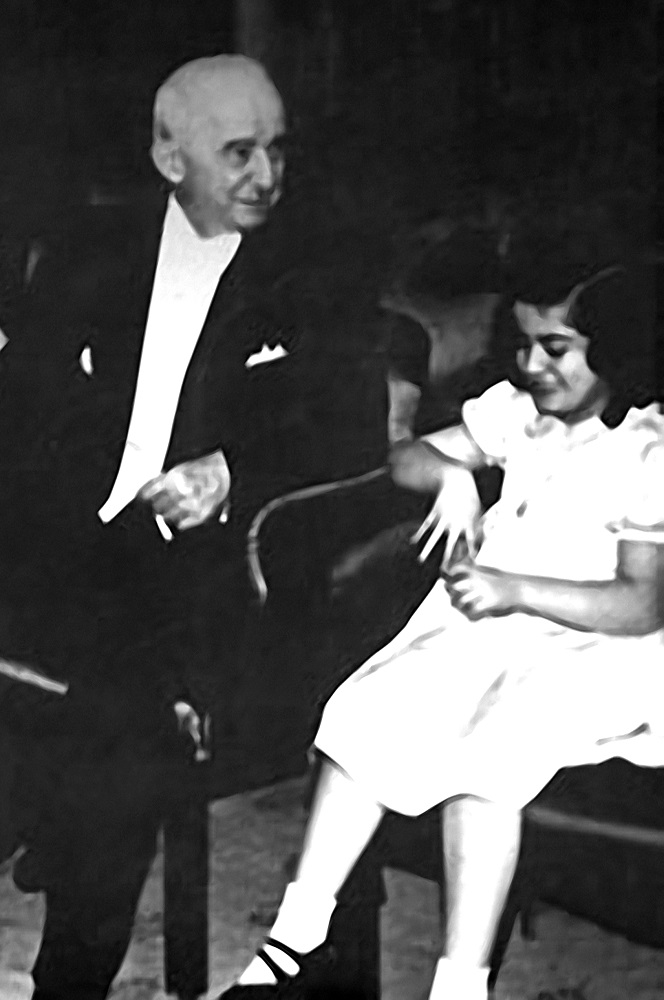 Like many British listeners, I knew Biret's prolific recordings for Naxos and others, spanning the entire piano literature, but that she was still playing a huge programme of 20th century masterpieces from memory – with mixed results, it has to be said, but when good, great – confirmed a phenomenon. I had to talk to her. Fortunately when the wonderful organisers of the Istanbul Festival put it to her husband and manager, he approved, on the strength of being a Yale graduate and seeing that my publisher was Yale University Press.
Like many British listeners, I knew Biret's prolific recordings for Naxos and others, spanning the entire piano literature, but that she was still playing a huge programme of 20th century masterpieces from memory – with mixed results, it has to be said, but when good, great – confirmed a phenomenon. I had to talk to her. Fortunately when the wonderful organisers of the Istanbul Festival put it to her husband and manager, he approved, on the strength of being a Yale graduate and seeing that my publisher was Yale University Press.
What followed were two of the most enchanted hours I've ever spent with a great performer – plus my own entourage, minder-guide included: it was quite a tea party. Once we settled down to recorded conversation, I started with the recital I'd just heard.
DAVID NICE How did you decide what to play in your 20th century programme?
IDIL BIRET I was tempted to play Ligeti and Boulez, but I thought it would be too much for the audience, so I thought – well, after all Fauré also lived and composed in the 20th century. And then I thought Petrushka would be an easy piece for people to understand here. Because many of the folkloric tunes are similar – the first dance theme, it could be a Turkish tune. That's why it works. And the second part began with Gaspard de la nuit, which is quite a difficult piece for the audience.
"Scarbo" [Ravel's third piece], perhaps, requires great concentration from the audience as well as the pianist...
When you look at "Scarbo", the nuance, it's most of the time piano, two pianos, three pianos. Then suddenly it bursts out, an extraordinary piece. It's very evil, in fact.
I had never heard the right-hard figuration in "Ondine" quite so clear – to get such delicacy, and to balance the different voices, can't be easy.
It's very complicated. There also he's very clever in noting the pedalling, it's not just the feeling – it has to be very clear, like drops of water. I love "Le gibet", it's not easy for the audience again.
If you're centred, it's meditative and concentrated.
There's a very interesting recording of Ravel playing "Le gibet" which gives a good idea. And the Prokofiev [Second] Sonata, I thought it would be easier for the audience than if I played the Seventh or the Eighth. I love the Eighth - and the Fourth, which is not very often played. That's a pity. [Pictured below by Ali Guler: Idil Biret after her Bosphorus University recital]
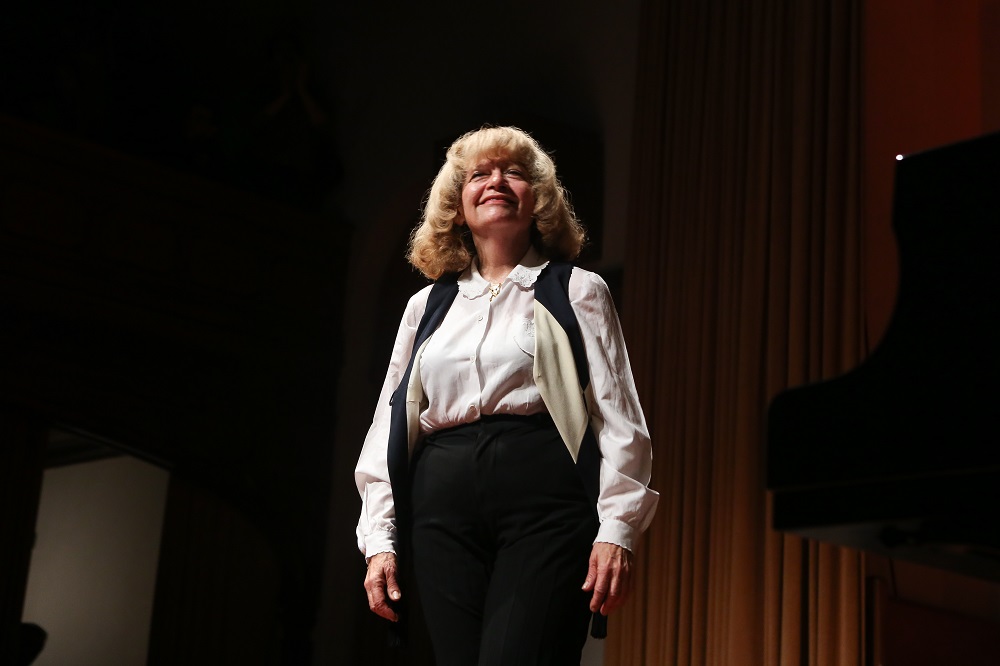
It made such logical sense last night, because there are some very unusual lines and compressions, but it was very clear. Sometimes it feels like – here's the second subject. But this was all connected. And the sound was so different for each piece – this is what one dreams of in a pianist, sensitivity to each style. You're moving on to an all-Bach programme – there has to be Bach, doesn't there?
Oh, of course, Bach is essential. The last recital [of three] is all Bach, and there's always this problem of how to play Bach on the piano. The clearer the better. I don't know, I try to follow certain issues, ornamentation, to be very careful. There are so many different ways of playing Bach, but I think the line, the polyphony is very important. I love the fugues, I think they're extraordinary, I love the challenge to be able to make the difference between all the voices.
Do you play Bach to freshen up, when you start practising? What's your grounding?
The "Feux Follets" [the fifth of Liszt's Transcendental Etudes] It's a very good exercise [everyone laughs], and it's a lovely piece. I play the second version of the Transcendental Etudes, there's not so much difference in "Feux follets", but the beginning of "Chasse neige" is more interesting, there is a sort of recitative, and I think it's better that than to start right away on the [sings main melody], I'm impressed by his change. It's very difficult but better musically. When I begin I also play scales, of course, the Etudes of Chopin and Brahms.
Idil Biret plays on Liszt's piano in Weimar
What about Schubert, who's to feature in your second programme? I imagine the older one gets the more important Schubert becomes – that pain transcended.
But you know, it's interesting, because I'm just wondering why Schubert needed to write a piece like the "Wanderer" Fantasy, because it's so different from his usual way of writing, it's extremely virtuosic, and there are places which do not come naturally under the hand, you have to think of what to do and try to conceive something, because it's really problematic sometimes.
And the later sonatas not?
No, but there even I noticed something in the first movement of the A major [D664] that I'm going to play in concert [sings the main theme], there's a place in the development with the octaves [sings], it's just a bridge, not very important thematically, it's not something which will change a lot the meaning of the first movement, but then I notice that very often it is played very loudly. It should be softer, one should not insist too much upon it. I wonder why it is played that way. If you start hearing all the octaves going up, it's a bit strange. I want to know why.
How much has your attitude to certain pieces you know well changed over the years?
Every time I play a work I haven't played for a long time, I study everything again like from the beginning. Then I discover that there are certain bad habits which can develop if you don't pay attention. I read Busoni saying exactly that, I have to work over everything right from the beginning, otherwise certain bad habits you've developed without really noticing creep in. So that can be quite a problem. Even to change one or two notes – this is also a trap. For instance with the Gaspard de la nuit, I was looking this time in "Ondine", for instance, I was telling you about the pedalling – he goes very carefully with the pedalling. It's only there in certain places. Others are really clean, like droplets. There is no end to it because you always try to find and see what you forgot to notice before. Or things which seemed to you important and which are actually secondary, in the architecture of the piece.
I'm fascinated to learn that you studied with Nadia Boulanger [Biret pictured with her below], Alfred Cortot and Wilhelm Kempff.
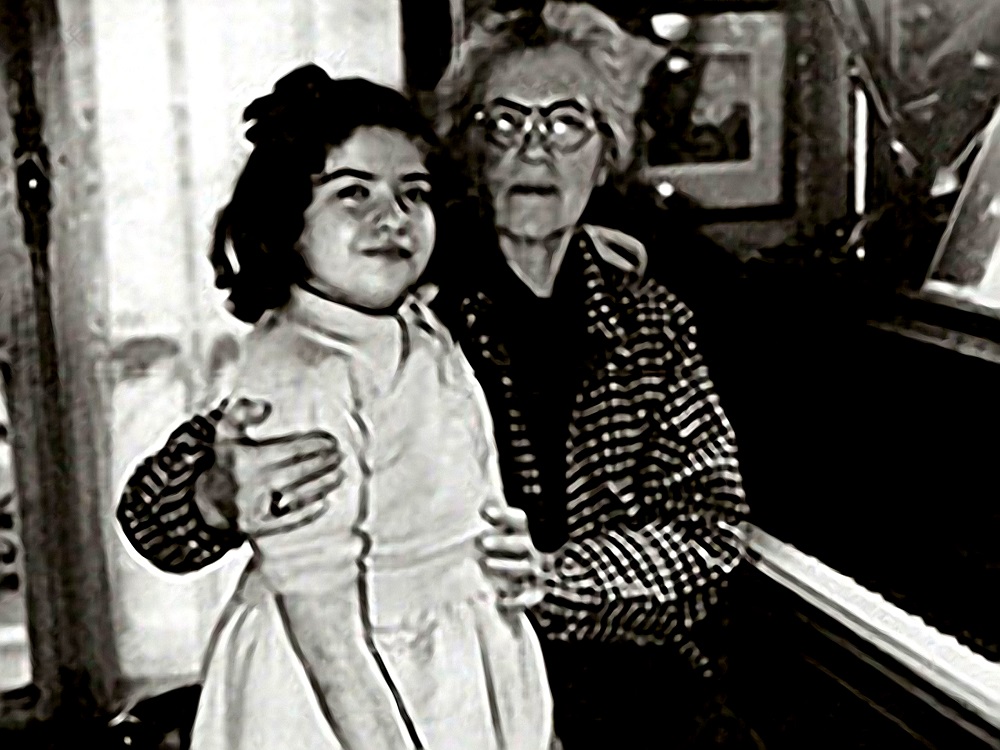 Yes I did, I was very lucky. For Boulanger, the analysis and conception of the work was very important. It was not only theoretic, though. Once I went for a lesson having prepared harmony and counterpoint, and she would say, "no, I'm not interested in that, could you start playing what you are practising now", and she'd start saying, "that's too loud; no, that's not legato enough, no, you have to do that again". Sometimes it was one hour on two bars. And I think it was wonderful. At the time I was a little bit bored in a way because I was 10 or 11 years old, but then it's vital to practice like that. Also I studied with a pupil of hers who was also a pupil of Alfred Cortot, Mademoiselle Bonneville, and this lady was quite extraordinary, because with her brilliant mind she was an exceptional synthesis of Cortot's teaching and Boulanger's. She had singing lessons with a retired baritone at the Paris Opera, he was living in Nice and she went regularly to ask how he would conceive a phrase, how he would sing it. So she had developed a whole way of breathing, of thinking in really big phrases. I learned from that lady an incredible amount.
Yes I did, I was very lucky. For Boulanger, the analysis and conception of the work was very important. It was not only theoretic, though. Once I went for a lesson having prepared harmony and counterpoint, and she would say, "no, I'm not interested in that, could you start playing what you are practising now", and she'd start saying, "that's too loud; no, that's not legato enough, no, you have to do that again". Sometimes it was one hour on two bars. And I think it was wonderful. At the time I was a little bit bored in a way because I was 10 or 11 years old, but then it's vital to practice like that. Also I studied with a pupil of hers who was also a pupil of Alfred Cortot, Mademoiselle Bonneville, and this lady was quite extraordinary, because with her brilliant mind she was an exceptional synthesis of Cortot's teaching and Boulanger's. She had singing lessons with a retired baritone at the Paris Opera, he was living in Nice and she went regularly to ask how he would conceive a phrase, how he would sing it. So she had developed a whole way of breathing, of thinking in really big phrases. I learned from that lady an incredible amount.
Now Nadia Boulanger would say, for example, you have to go to the end of the street. You see the street but there are benches all the way along. If you start sitting on every bench you will never reach the end of the street. It's true, if everything you play and you sit there and you don't see the long line – I think that was a wonderful image. And Mademoiselle Bonneville was following very much that line. Quite an extraordinary person. What I liked in her was her modesty. She was never part of a clique. She wanted to be independent. Formerly she used to teach at the École Normale de Musique, because she was, as I said before, a pupil of Cortot.
You did work with Cortot too?
Yes, for three years. Every month he came to Paris. It was very important that I was taught by these two ladies, and [Wilhelm] Kempff and Cortot. Their priorities were very similar. Kempff would also say, make a big line, always think in long phrases, don't cut it into pieces.
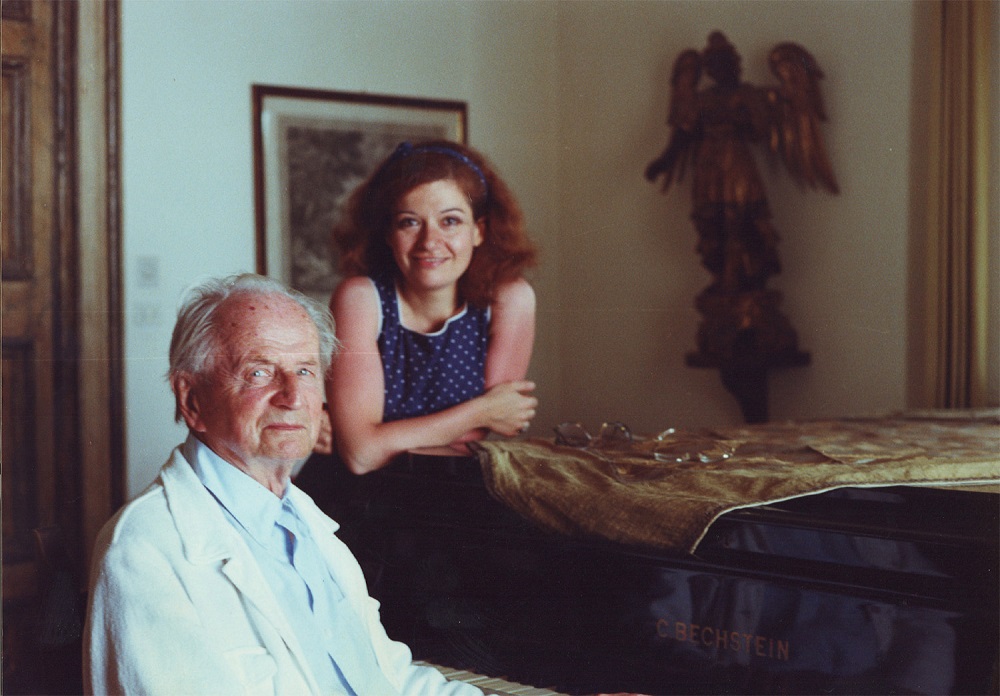
What was Kempff's own special contribution [pictured with Biret above]?
His core was Beethoven, that was the centre of his world. He played very often the sonatas. When I was eight years old I heard him play all 32 sonatas in Paris. There were certain sonatas that were closer to my mind and heart, but then I worked with him on the sonatas, plus I went to Positano where he had his masterclasses, twice. Normally you were allowed to go only once. But he knew me from a very early age. The first time I went I was 16, I prepared Op. 110, the next time I prepared more things. But then also I went to have some sort of lessons with him when he had time at his home in Germany. I went there for 10 days at a time. But he was very exact, if it was written in the score pianissimo it had to be pianissimo. If there was a crescendo it had to be followed exactly. And a mezzo-forte was never to be forte. He was very careful about these things. "You don't do the right thing here, it's staccato and you play it legato". Very exacting. So that was wonderful, And he liked simplicity when you played. "Don't overdo it, you are exaggerating again [taps table], don't!" He was very classical in his lines. So was Cortot, very attentive to details and nuances, and I think they admired each other very much. And Kempff said, "my dear, old friend Cortot is one of the greatest musicians I have ever known". I was very fortunate.
 Where did this interest in the whole breadth of the piano literature come from? I should imagine no-one has covered as much repertoire as you.
Where did this interest in the whole breadth of the piano literature come from? I should imagine no-one has covered as much repertoire as you.
First I had to go to the Conservatoire with the scholarship from Turkey, they wanted me to get a diploma. I was in the class of Jean Doyen. He was a very good pianist, clean and with a wonderful technique. But in these classes you couldn't play a lot of repertoire. We had not a bad repertoire. We had to play Chopin Etudes, Czerny Etudes of course, a Bach Prelude and Fugue, a different one every time. It was a programme we were changing every two weeks. Also romantic piece was important, and maybe Fauré or something of the French music, and a concerto, so it was not a bad programme, on the contrary. But then when I finished at the Conservatoire I didn't have too many works, so I said, I have to do something, I started studying, it was a little bit crazy, I learned each week one new concerto, one romantic piece, one important 20th century piece, and then Bach or classical repertoire. I did it for two years. I had an upright piano next to the grand piano, and my neighbours were not too happy to hear me practising. So I had the idea to put paper in the upright piano so the sound wouldn't be too much. Fortunately I did it then, because the earlier you learn certain pieces, the more comfortable you are with them later. For instance the [Beethoven] Hammerklavier [Sonata] I played when I was 18 – it's a bit mad to do it that way, but then it's in your subconscious.
I was thinking in the concert – to play all this music from memory, you played the other programmes from memory too, right? It's phenomenal that this is all within you, but it stays there.
[Shrugs] Sometimes you have to have to use the score when you're playing a very complicated piece full of traps, with the orchestra [Biret pictured below this summer playing the Grieg Piano Concerto at the D-Marin Festival] it's better to be on the safe side. It's better to have a good interpretation than to show off. I'm not interested at all by that, it's much better to do the thing properly.
Your memory has constantly served you well?
I don't know, I learn [laughs].
But you're containing within you the entire piano literature. You have to keep practising, refreshing, studying the score?
Of course. But once you have all these things in your mind it is there.
Muscle memory is important, isn't it? Prokofiev talked about playing the Second Piano Concerto after five years, how it had gone out of his fingers. So this happens.
Also it's a question of how carefully you have studied. For example I have played this season the Second Bartók Concerto. And I thought, well, everything is in my mind, and it came very easily.
Idil Biret plays Bartók's Second Piano Concerto with Sir Charles Mackerras and the Sydney Symphony Orchestra
And the physical strength: was there any teacher who taught you the weight on the piano?
Both Nadia Boulanger and Kempff were organists. So one day Nadia Boulanger told me – she had an organ in the living room – "just sit and play a few notes on the organ. And then you will see you don't play legato". And I heard notes which were just jumping, it was just horrible. Then she said, "you have to use a certain fingering and then only to keep the note until the very end and not come off before, this is the way". And that was a source of inspiration to me. You can always imagine new things and develop the technique – there is no end to the development of technique.
How did Mme Bonneville apply her knowledge of singing and breathing physically to the piano?
I can give you an example, when you start a piece, before starting, you have to breathe and be seated in the right way. And you hold your breath and then you start. Unless it is asked that you make an accent – but the accent also has to go further, but not to be something that kills the impulse. Then you go and you see all the phrase and you hear the totality of that work, it is a question of imagination maybe, and then also she told me a lot. It is like applying a winch – don’t lose energy, bring the pressure down like a winch, or a crane. Even when you play pianississimo you have to give more energy, everything has to speak.
I’m interested how you came to play works like the Boulez sonatas.
It started when I was in Paris, the director of an important 20th century music festival had asked me to make two recordings when I was 17 or 18, and I recorded first some Bartók with the Prokofiev Seventh Sonata, and then a recording of Brahms Handel and Paganini Variations. As festival director he said would you like to play contemporary music? And just at that time Nadia Boulanger said, "it’s terrible, you don’t play anything contemporary, you have to play it otherwise you are not a complete musician", and the same thing had been told to me in Germany by Licco Amar the Hindemith specialist who was teaching violin music here. So I said, I will try. Claude Samuel said, would you play the Boulez Structures for two pianos? I replied, with pleasure, and then he wanted to create a work by Andre Boucourechliev, Archipel No 1 for percussion and two pianos, and also of course the Bartók Sonata, so we did that, we rehearsed quite a lot.
Who was the other pianist?
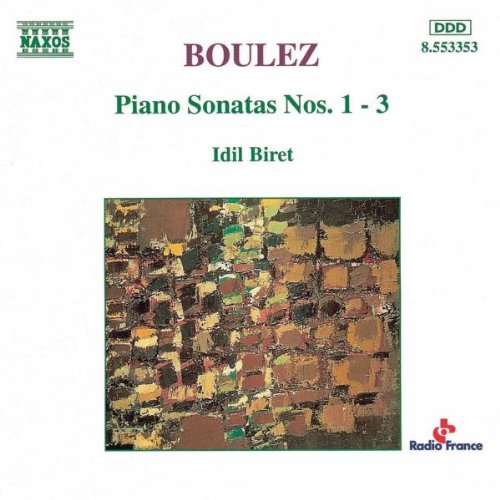 Georges Pludermacher. So we made the Boulez Structures. I liked it very much and found it very exciting, especially in the way he used the piano. Very interesting. So I worked on the Second Sonata, I played it and recorded it in New York, and later Naxos took on a recording of the Boulez sonatas, and I’d only done the second, the first and third never. So there was some hesitation.
Georges Pludermacher. So we made the Boulez Structures. I liked it very much and found it very exciting, especially in the way he used the piano. Very interesting. So I worked on the Second Sonata, I played it and recorded it in New York, and later Naxos took on a recording of the Boulez sonatas, and I’d only done the second, the first and third never. So there was some hesitation.
[Şefik Yüksel interjects] I resisted it. Because after we married I tried to stop her playing too much percussive music so that I could hear some Chopin [laughter all round]. Because if you play this music too much it has an impact on everything else you play. Our successful distributor went to Klaus Heymann who resisted it, hated the idea, said, no we aren’t going to be able to sell it. Finally the distributor got Idil to say yes, and Claude Samuel was in charge of France Musique then. So it became a joint effort with the radio which meant that the costs were down for Naxos. Klaus must keep costs down, I said it’s good for her prestige, and then in six months we sold 50,000 copies. They were selling at six dollars, you bought it out of curiosity. If you priced it at 20, you sold nothing.
[Back to Idil] Then I had to learn the first and third sonatas in January for a recording to be ready by the end of March. That was really hard work, I must say. But then I remember the last recording session, because I was going to fly back in the evening to Switzerland, and I thought, how am I going to finish this Third Sonata, there was one place where I was really tired, I said, give me five minutes, I will just practise, and then, I don’t know how it worked, but it did. I said, I don’t believe it, and I will even be able to take the plane at the right time! That was how it started.
I still haven’t heard your transcriptions of the Brahms symphonies – was this in homage to what Liszt had done with the Beethoven symphonies?
It's a slightly strange story. When I came to Paris I was seven, eight years old, in France Brahms was considered a very minor composer – they’d say, he’s not inspired etc. Madeleine de Valmalète, who was a family friend, said, you have to listen, and she played one of the intermezzos, and I was amazed – what is this beautiful music? She said, it’s Brahms. I at once tried to find all the Brahms I could. There was a Turkish composer, Nevit Kodallı, who studied with Nadia Boulanger in those days, and he said, Brahms is a very important composer, but unfortunately they don’t understand him in the right way. I heard also the symphonies, and my parents bought a recording of the Second Piano Concerto in the version with Toscanini and Horowitz, but it was on 78s, and I was stopping every time the record stopped, because I was learning it by ear. And the symphonies I learned that way, I started to play them for my pleasure, and one day I said, it’s not very serious, I have to work and see how it is written, so I bought the score and I tried to make a transcription from the score and also from his two-piano version. But then I realised there was something missing, because when you hear the symphonies in the concert hall, you hear harmonies and all kinds of other sounds which are not written. The dilemma was, am I going to make a real transcription from what is written or what I hear, the other sounds – that was really difficult, and I’m not yet quite sure. I did finish the Fourth and the Third, and the First I think it’s impossible, because you would need to add some arms.
What becomes more important to you in the piano repertoire now that you’ve reached 75? What could you not live without?
Listening or playing?
Both.
You know, it’s difficult, because when I am working on a piece, I am completely within that piece, it’s difficult, but – Bach has made a very big impression on me. He was my favourite composer as a child, so it’s a sort of coming back.
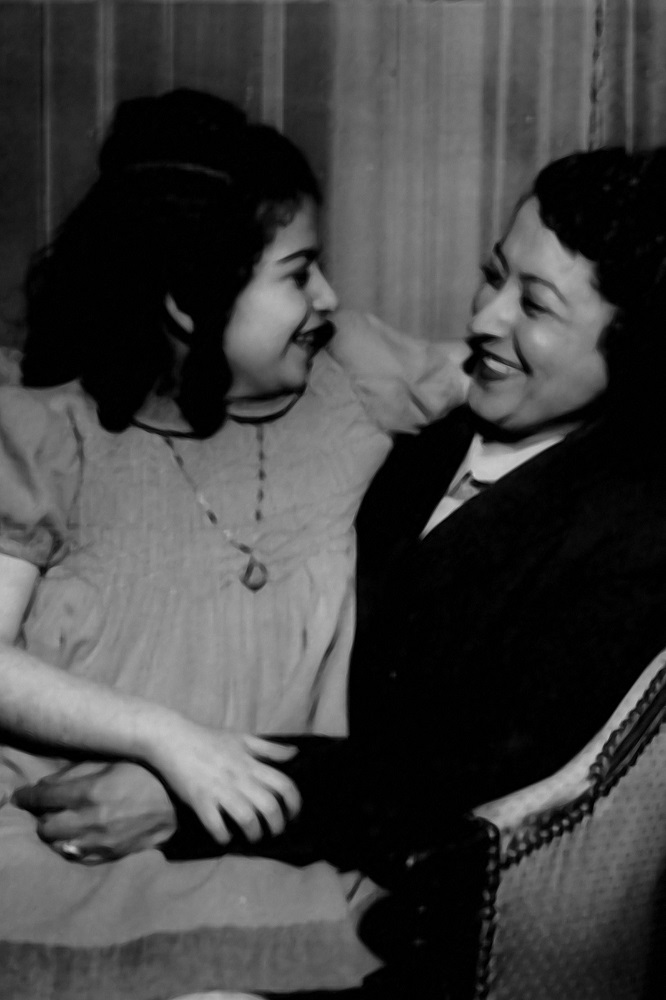 It’s quite unusual for Bach to be a child’s favourite [Biret pictured right with her mother].
It’s quite unusual for Bach to be a child’s favourite [Biret pictured right with her mother].
Yes, I don’t know, it’s so clear, and with no doubts as to what it is. But maybe – Mozart now I start liking more and more. Before I loved the operas, but the piano music I didn’t think was up to the same level. The piano concertos, especially certain ones, K491 I always adored. But then I discovered playing the G major with the variations, it’s extraordinary, it has this fantasy, and most of the concertos are beautiful. I love Scriabin very much.
Have you played all ten sonatas?
Yes, I did, but unfortunately Şefik is not so fond of the late sonatas.
[Şefik Yüksel] I’m not encouraging her. She just finished recording The Well Tempered Clavier. That’s where I adored her, instead of the ten piano sonatas, she has already recorded the Etudes. And we don’t have unlimited funds to do what we do – we’re making them essentially ourselves, with Naxos distributing them, and I thought Bach was more important at the time, and I thought perhaps ten Scriabin sonatas were not so necessary.
But there's an evolution there.
[Back to Idil] Extraordinary ideas, I love also the way he has developed this harmonic system. I think he’s a very important 20th century composer. What else? It’s difficult to say. It will sound maybe a little bit banal, but the last Beethoven.
And the last Schuberts?
Extraordinary. Now I discover more and more. The F minor which Kempff played, they say it’s unfinished, in fact I don’t see why, because the three movements are very harmonious. This sonata is very out of the ordinary. Strange how in the third movement the tonality he chooses, the second time you expect something different. I like to listen to chamber music very much – Schubert, Mozart, Beethoven.
Did you play much chamber music?
I did. I played Schumann and Franck Quintets, Brahms, with the London String Quartet. I love to listen to the Mozart violin sonatas, Beethoven and Brahms Cello Sonatas.
Are you going to hear Meneses and Pires tonight [they were giving a recital in the nearby opera house]?
Unfortunately I have to practise, because tomorrow is another programme and I have to be very well prepared. I would have loved to, that’s the only reason why not.
Your roots are in Turkey and now you’re here again, have you always felt you belong here?
[Şefik Yüksel] Actually we have a number of homes – I worked for 25 years in Brussels, so we have an apartment there, I was managing director of the Association of European Airlines. So Idil came there and lived with me, and this is her mother’s house, so we’ve been on the two sides for a long time. I retired some time ago, so now we have a house in Paris, so we rotate. But this for me is home.
[Back to Idil] I love the view I have from here [pictured above with Şefik on the balcony], I practise on that [electric] keyboard so I can see it, I put the level down to pianissimo so I don’t disturb the neighbours. I feel at home in most places, because I grew up in Paris, I went there as a child, so I’m rather comfortable. I think you can find everywhere something, and the rest you create. I like to hang on to all these books, because now books are tending to disappear. I don’t enjoy reading on Kindle. It’s such a pleasure to read a real book.
So wherever books are is home.
Scores and books, that’s exactly how it is. That’s very important. If I have books and a place where I can walk or swim. Unfortunately we cannot swim in the sea.
Can you swim off the Princes Islands [where the couple rent a house for August]?
So far. I used to swim here in the 1960s, so my parents were sitting on the balcony and I would wave to them from the sea, and there was the place for ladies, I would go there. Three generations of us have been here – both my grandmothers lived here, more or less in the same district. Şefik was born in Moda, half a mile from here. There was a time when I knew practically everyone, it’s a village, but not any more. Istanbul became huge, 15 million.
[Şefik Yüksel] Istanbul had a population of 1.2 million back then. Constantinople had 600,000 people. So in 1500 years it was stable, and then in the last 30 years it exploded. Terrible problems. They emptied the cities of the east, everyone came here, the building projects were insane. All the opportunities were here. And now they can’t cope, they’re building a third bridge under the water, there’s no end to this, and the city can’t cope. We don’t know what will happen. But this corner is an enclave.
[Winding up, with warmest thanks to Idil] I get the impression you’re a very contented, happy person.
[Laughs] One shouldn’t be too comfortable, you know what I mean, it’s not a good thing. But maybe by nature I’m rather optimistic, that’s always a good thing. Nothing is absolutely 100 per cent bad or good, the truth is always somewhere in the middle.

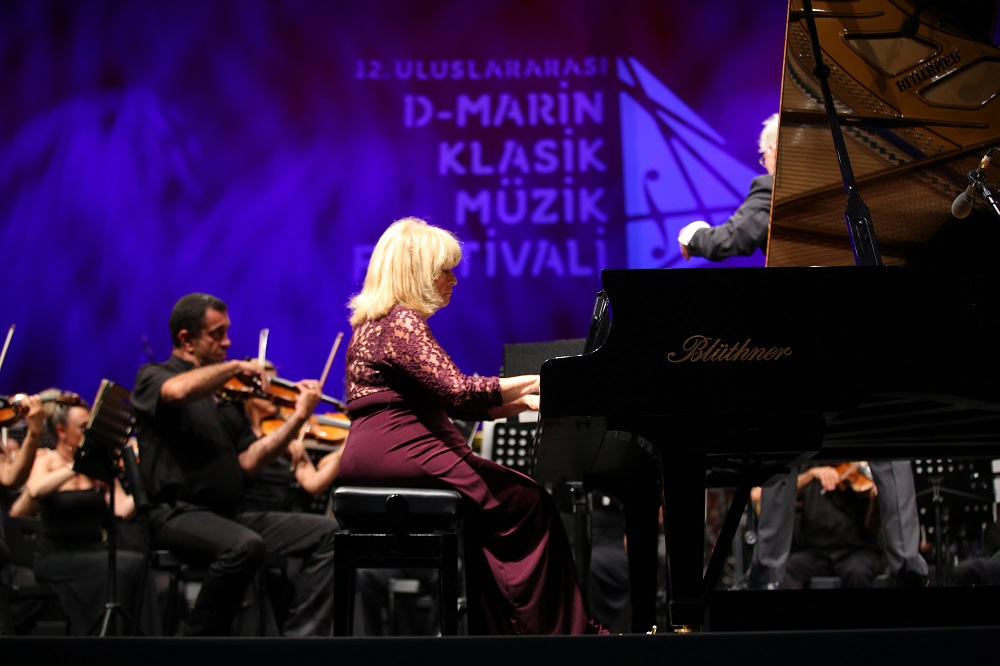
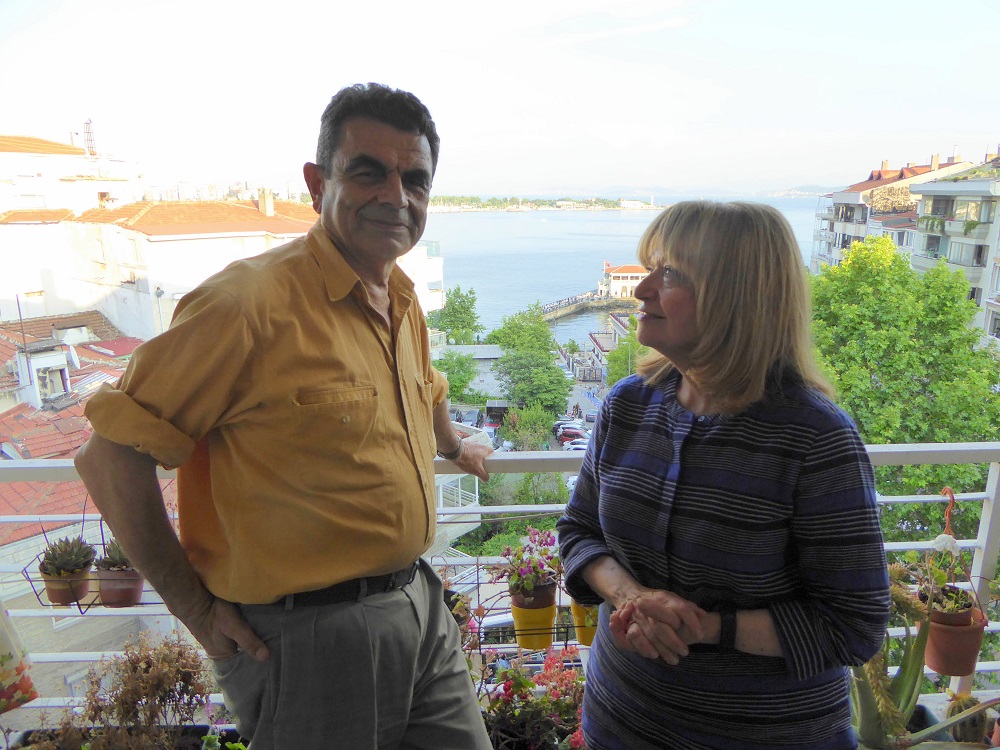












Add comment